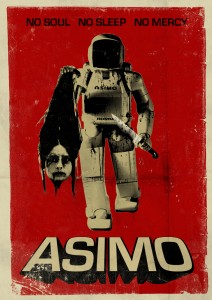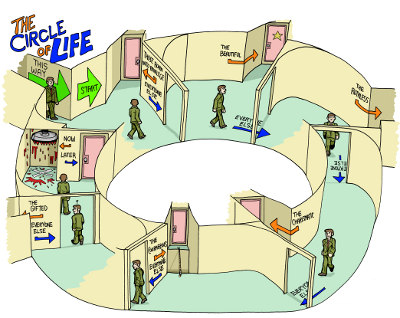Before I dig into the event itself I’ll make a few introductory remarks. One, I like the presenters from the IAS. I personally find them to be engaged, interesting, and respectful people who I am going to try very hard not to slam in this report back because I don’t actually feel badly or angrily toward them. Their ideas are another matter.
In part one of this report back I am going to try to give a neutral report back of the events that transpired the evening of November 14th 2009 at Station 40. In part II I will try to analyze what I think the IAS did well, and not so well, on what I believe are their own terms. Finally, I will present my own analysis of the proposals, strategies, and opinions presented.
Starting around 7:15 (for a 7:00 event) the IAS members spoke for nearly two hours straight with almost no feedback from the crowd. The three presenters were Harjit Singh Gill, Joshua Stephens, and Cindy Milstein who spoke in this order. Harjit is a popular (in the social sense of the term) anarchist who has been active in the Bay Area for at least half a decade. Joshua is out of Washington DC and his most recent activities there have been around building a self-managed workplace (that walks dogs!). Cindy is a recent transplant to the Bay Area from Vermont where she is known as a protege (although she will probably find this unfair) of Murray Bookchin and organizer of the RAT Conference.
The questions that they asked and answered during their two hour presentation were (and these will be rough approximations because they only said them once (and quickly) and the questions weren’t entirely obvious to me from the answers):
1) What does it mean to take ourselves seriously? (as anarchists)
2) What is a theory of strategy that makes sense for anarchists?
3) What are specific examples of democratic strategies?
(here I will share notes rather than full writeup for sake of brevity and to prevent too many sidebars)
Question One
– Serious
Harjit: Defined socialism broadly and anarchism as part of socialism. Spoke to the faith required to be an anarchist when there are so many examples of human failure. Also spoke of the ethical obligation to action rather than sitting on the couch and watching Lakers games. Described this kind of inaction as “nothing to it (anarchism)”. Concluded by saying that “With great power comes great responsibility”.
Joshua: Argues that the points of encounter should move from direct confrontation with authority and against the idea of “transformation on the barricades”. Instead argues that communication with clients (as a dog walker) is a more productive point of encounter in terms of sharing @ ideas. Is concerned with many of “our” ideas being co-opted, especially by the moderate left, like directly democratic decision making, perhaps being cherry picked by groups and people more mature than anarchists themselves. Told the story of a client who argues that the @ notion of transformation on the barricade goes against sense as our current condition reflects generations of socialization, ideological formation, trauma, etc. This client them makes the claim that economics is the study of human behavior as groups and provides better answers to questions about human potential and activity than anarchist triumphalism.
Cindy: Begins with the claim that our entire society are in a horizontalist period and we need to reclaim the term. Also argues that anarchists have a constellation of values that makes our “political offering” distinct (against capitalism, hierarchy, being holistic) and this begs the question…
Are we relevant? What is our message? What do we want to say?
Cindy’s answer seemed to be that we (@) need to problematize cracks as part of our strategy for winning.
Question Two
– A Theory of Strategy
Harjit: Is a social worker who is paid by the county. Explains a theoretical underpinning to social work in the form of the 5 stages of change. They are
- pre-contemplative – unaware problem exists with no intention of changing behavior
- contemplative – becoming aware of problem but uncommitted to change
- preparation – intend to change but without specific goal
- action – when behavior changes and goals are attained
- maintenance – consolidation of gains and prevention of relapse
His strategic observation is that if our goal is to win then we are best off being efficient about how we approach our goal. Most anarchists shoot themselves in the foot by trying to organize other anarchists who are often (usually?) in the pre-contemplative stage and not the action stage. The better strategy is to organize people who are already in the action stage, along anarchist lines, but who aren’t necessarily anarchist themselves. Put another way we should be organizing beginning with behaviors rather than opinions.
Joshua: Re-iterated Harjit’s point about behavior > claims of belief. Discussed an idea of “social capital” that was claimed to be the motivation of many (most?) anarchists who participate in “the scene” or the subcultural aspects of @ (dressing, food not bombs, WWW1). Reiterated Cindy’s message about the importance of our messaging especially when we do actions that aren’t comprehended easily (spectacular Whole foods expropriation or dumpstered food sharing as examples). Finally is concerned with the dominance of the “idols of the tribe” aka infoshops, FNB, Critical Mass, etc.
Cindy: Food is great but not a differentiator for @. We should work on projects that re-inscribe use value (exact quote). Examples have problems but…
1) Toronto’s use it or lose it bylaw campaign that would see abandoned buildings expropriated by the City redeveloped as affordable housing or community infrastructure along socially just lines. (editorial here
2) Time banks – exchange goods and services without using money. Instead, our members buy and sell services for Community Credits, a time-based currency.
3) Greece people’s park project (no link found) where an event was scheduled for land that transformed it into a multi-use park. “Taking things in common”
Question Three
– Examples of action
Harjit: if the goal is to democratize strategy then
- Lesson from anti-colonization struggle of Guinea-Bissau: There needs to be a disciplined strategy of specific infrastructural replacement (1:1). Medical personel were used as the primary example. Local lesson: gain skills
- Lesson from RAC-LA: equality of action, go to people with the things they need (boxes of food), localism.
Joshua: Argued for starting a business (worker controlled) as a useful strategy. Business is the place to exploit the discursive vulnerabilities in capitalism (direct quote) regarding
- self-determination
- Dignity
- health care
This business can offer a reconstructive vision of
- cooperation
- sustainability
- health care
- serving as an example
- becoming specialized
- freelancer (immaterial labor) unity
Cindy: Says that the best strategy is strategies. Perhaps a wiki? Anarchists are very good at try, try, try & fail. We should hold an anarchist (strategy) summit where we call the shots. There may be oppression but it would be them coming to us and perhaps we could do something interesting about that. We should hash these ideas out with Discussion Bulletins (aka disco bull in L&R era). We need to work on our branding by being distinct, not apologizing, and looking good.
End notes.


